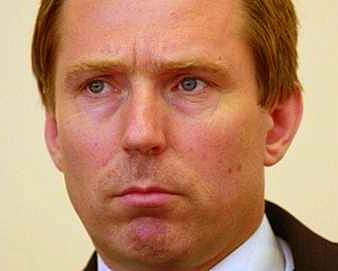The Pardoner
The modern equivalent of the Medieval pardoner is an auditor, as the career of Jan Dzvonik well shows.

Geoffrey Chaucer's Gentle Pardoner of Rouncival...
A Medieval pardoner or quaestor of alms did not have the right to sell indulgences and to pardon sins for money. But many did, to enrich the Church they served –and themselves. For three hundred years or more, the Church allowed this practice to flourish, until it was finally outlawed in the middle of the sixteenth century.
The secular equivalent of the pardoner in the modern age is an auditor, as the career of Jan Dzvonik well shows. For over twenty years, Dzvonik has audited the books for Miroslav Kalousek, Bohuslav Sobotka and Martin Roman, in their several ministerial and managerial functions, perhaps not always in ways that have enriched the state he serves.
An indulgence for Kalousek
Let us begin at the beginning, when Miroslav Kalousek was a Christian Democrat and the Czech defence ministry an outpost of the Church. For eleven years, from 1993 to 2004, Jan Dzvonik worked as an auditor at the ministry. For five of those years, his boss was Kalousek, the deputy minister responsible for the ministry's financial affairs.
In 2002, Dzvonik himself took Kalousek's job. His minister was CSSD’s Jaroslav Tvrdik, who went on to pull the wings off the Czech national airline in just thirty months of mindless destruction, all of it supervised and audited. But more of that later.
In 2002, the police were threatening to open an investigation into an earlier sale of a Prague barracks made under Kalousek‘s tenure. Pardoner Dzvonik issued a ‘position’ (or an indulgence if you like) on behalf of the ministry in which he confirmed that the state had suffered no financial damage from the sale of the barracks, and an investigation was avoided. Kalousek was forgiven.
An indulgence for Sobotka
Jan Dzvonik has audited the finances of various entities controlled by the finance ministry in the last decade. As finance minister, Bohuslav Sobotka put him onto the supervisory boards of the National Property Fund, Mero, Letka and Aero Vodochody.

...and Kalousek's devoted Dzvonik.
In 2006, Sobotka appointed Dzvonik chairman of the supervisory board of CSA in which post he approved a Business Class bonus scheme for the airline’s management. Three years later, as CSA was going bankrupt, the new finance minister, Eduard Janota, blamed Sobotka for the lavish bonuses. Sobotka hid behind his auditor Dzvonik, saying that the scheme was approved by the supervisory board of a joint stock company, not the finance minister as majority shareholder. And Sobotka was forgiven.
See here for an interview with Dzvonik in which he explains the CSA bonus scheme -it is risible.
And an indulgence for Roman
In October 2011, Miroslav Kalousek, now a liberal finance minister and no longer a Christian Democrat, ordered CEZ to conduct an internal audit of contracts between the firm and its turbine supplier Skoda Power. The audit was the finance minister’s response to allegations in the national press that Martin Roman was a related party in transactions between CEZ and Skoda Power.
The audit, published in January 2012, dismissed these allegations as journalistic gossip, concluding that there is “no evidence of informal relations that would indicate any improper, unethical or corrupt conduct.” And so Roman was forgiven.
The audit was led by Jan Dzvonik, appointed to CEZ’s audit committee by Kalousek in June 2011. Two months after the Skoda Power audit was concluded, Dzvonik replaced Zdenek Hruby (who died in a mountaineering accident last summer) as the audit committee’s chairman, where he remains to this day.
CEZ’s internal audit team, in its own words, ‘provides the company’s governance bodies with assurances that all risks – substantial ones in particular – are known and under control’. It is hard to avoid the suspicion that ‘under control’ is an auditor’s euphemism for ‘buried without trace’, or in ecclesiastical terms, for 'indulged and forgiven'.
An end to all indulgences?
In 1567, Pope Pius V cancelled all grants of indulgences involving money: the pardoner was finally out of business. Is Andrej Babis a latter-day Pius? Will Babis become the first Czech finance minister to outlaw the practice of auditors and supervisors selling indulgences to the managers they are meant to hold accountable?
We shall find out later this month, on June 27 at CEZ’s AGM. Let Babis remove all members of the supervisory board of CEZ and its internal audit committee as well. And let him replace them all with individuals whose independence is assured, that is, with qualified auditors and supervisory board members whose tenure in office depends, not upon the whimsical protection of this or that politician, but on their ability to deter fraud.

Geoffrey Chaucer's Gentle Pardoner of Rouncival...
A Medieval pardoner or quaestor of alms did not have the right to sell indulgences and to pardon sins for money. But many did, to enrich the Church they served –and themselves. For three hundred years or more, the Church allowed this practice to flourish, until it was finally outlawed in the middle of the sixteenth century.
The secular equivalent of the pardoner in the modern age is an auditor, as the career of Jan Dzvonik well shows. For over twenty years, Dzvonik has audited the books for Miroslav Kalousek, Bohuslav Sobotka and Martin Roman, in their several ministerial and managerial functions, perhaps not always in ways that have enriched the state he serves.
An indulgence for Kalousek
Let us begin at the beginning, when Miroslav Kalousek was a Christian Democrat and the Czech defence ministry an outpost of the Church. For eleven years, from 1993 to 2004, Jan Dzvonik worked as an auditor at the ministry. For five of those years, his boss was Kalousek, the deputy minister responsible for the ministry's financial affairs.
In 2002, Dzvonik himself took Kalousek's job. His minister was CSSD’s Jaroslav Tvrdik, who went on to pull the wings off the Czech national airline in just thirty months of mindless destruction, all of it supervised and audited. But more of that later.
In 2002, the police were threatening to open an investigation into an earlier sale of a Prague barracks made under Kalousek‘s tenure. Pardoner Dzvonik issued a ‘position’ (or an indulgence if you like) on behalf of the ministry in which he confirmed that the state had suffered no financial damage from the sale of the barracks, and an investigation was avoided. Kalousek was forgiven.
An indulgence for Sobotka
Jan Dzvonik has audited the finances of various entities controlled by the finance ministry in the last decade. As finance minister, Bohuslav Sobotka put him onto the supervisory boards of the National Property Fund, Mero, Letka and Aero Vodochody.

...and Kalousek's devoted Dzvonik.
In 2006, Sobotka appointed Dzvonik chairman of the supervisory board of CSA in which post he approved a Business Class bonus scheme for the airline’s management. Three years later, as CSA was going bankrupt, the new finance minister, Eduard Janota, blamed Sobotka for the lavish bonuses. Sobotka hid behind his auditor Dzvonik, saying that the scheme was approved by the supervisory board of a joint stock company, not the finance minister as majority shareholder. And Sobotka was forgiven.
See here for an interview with Dzvonik in which he explains the CSA bonus scheme -it is risible.
And an indulgence for Roman
In October 2011, Miroslav Kalousek, now a liberal finance minister and no longer a Christian Democrat, ordered CEZ to conduct an internal audit of contracts between the firm and its turbine supplier Skoda Power. The audit was the finance minister’s response to allegations in the national press that Martin Roman was a related party in transactions between CEZ and Skoda Power.
The audit, published in January 2012, dismissed these allegations as journalistic gossip, concluding that there is “no evidence of informal relations that would indicate any improper, unethical or corrupt conduct.” And so Roman was forgiven.
The audit was led by Jan Dzvonik, appointed to CEZ’s audit committee by Kalousek in June 2011. Two months after the Skoda Power audit was concluded, Dzvonik replaced Zdenek Hruby (who died in a mountaineering accident last summer) as the audit committee’s chairman, where he remains to this day.
CEZ’s internal audit team, in its own words, ‘provides the company’s governance bodies with assurances that all risks – substantial ones in particular – are known and under control’. It is hard to avoid the suspicion that ‘under control’ is an auditor’s euphemism for ‘buried without trace’, or in ecclesiastical terms, for 'indulged and forgiven'.
An end to all indulgences?
In 1567, Pope Pius V cancelled all grants of indulgences involving money: the pardoner was finally out of business. Is Andrej Babis a latter-day Pius? Will Babis become the first Czech finance minister to outlaw the practice of auditors and supervisors selling indulgences to the managers they are meant to hold accountable?
We shall find out later this month, on June 27 at CEZ’s AGM. Let Babis remove all members of the supervisory board of CEZ and its internal audit committee as well. And let him replace them all with individuals whose independence is assured, that is, with qualified auditors and supervisory board members whose tenure in office depends, not upon the whimsical protection of this or that politician, but on their ability to deter fraud.

 Lidé čtěte!
Lidé čtěte! Fialova odpovědnost za Blažka je velká. Neměl ho nechat běhat se žlutou kartou
Fialova odpovědnost za Blažka je velká. Neměl ho nechat běhat se žlutou kartou Ukaž, co máš za auto, ať vím, co jsi vlastně zač. Britové "setřou" každou značku
Ukaž, co máš za auto, ať vím, co jsi vlastně zač. Britové "setřou" každou značku Fiala v ohrožení. Premiér místo vysvětlování raději otvíral sokolovnu u Brna
Fiala v ohrožení. Premiér místo vysvětlování raději otvíral sokolovnu u Brna Babiš lechtá mladé na bradě. AB merchem rozjel fenomén, který nejde zastavit
Babiš lechtá mladé na bradě. AB merchem rozjel fenomén, který nejde zastavit

